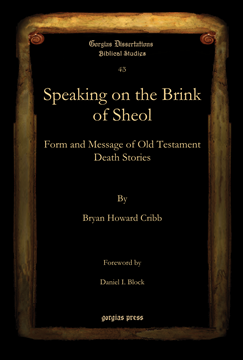Daniel I. Block
Speaking on the Brink of Sheol
Form and Message of Old Testament Death Stories
By Bryan Howard Cribb; Foreword by Daniel I. Block
Series: Gorgias Biblical Studies 43
ISBN: 978-1-4632-0375-7
Since its inception at the beginning of the twentieth century, form criticism has diminished in popularity and use in recent years. Bryan H. Cribb’s studies demonstrates that, if appropriately modified, form criticism still has much to add to Old Testament studies. Using a synchronic and inductive approach to the text, Cribb engages in a form critical study of nine “death stories” in the Old Testament. In so doing, he not only provides substantial support for the existence of this genre, but he also shows how remarkably fruitful such a study can be in revealing the messages of these accounts.
$118.00 (USD)
Speaking on the Brink of Sheol
Form and Message of Old Testament Death Stories
By Bryan Howard Cribb; Foreword by Daniel I. Block
Series: Gorgias Biblical Studies 43
ISBN: 978-1-60724-671-8
Since its inception at the beginning of the twentieth century, form criticism has diminished in popularity and use in recent years. Bryan H. Cribb’s studies demonstrates that, if appropriately modified, form criticism still has much to add to Old Testament studies. Using a synchronic and inductive approach to the text, Cribb engages in a form critical study of nine “death stories” in the Old Testament. In so doing, he not only provides substantial support for the existence of this genre, but he also shows how remarkably fruitful such a study can be in revealing the messages of these accounts.
$172.00 (USD)


